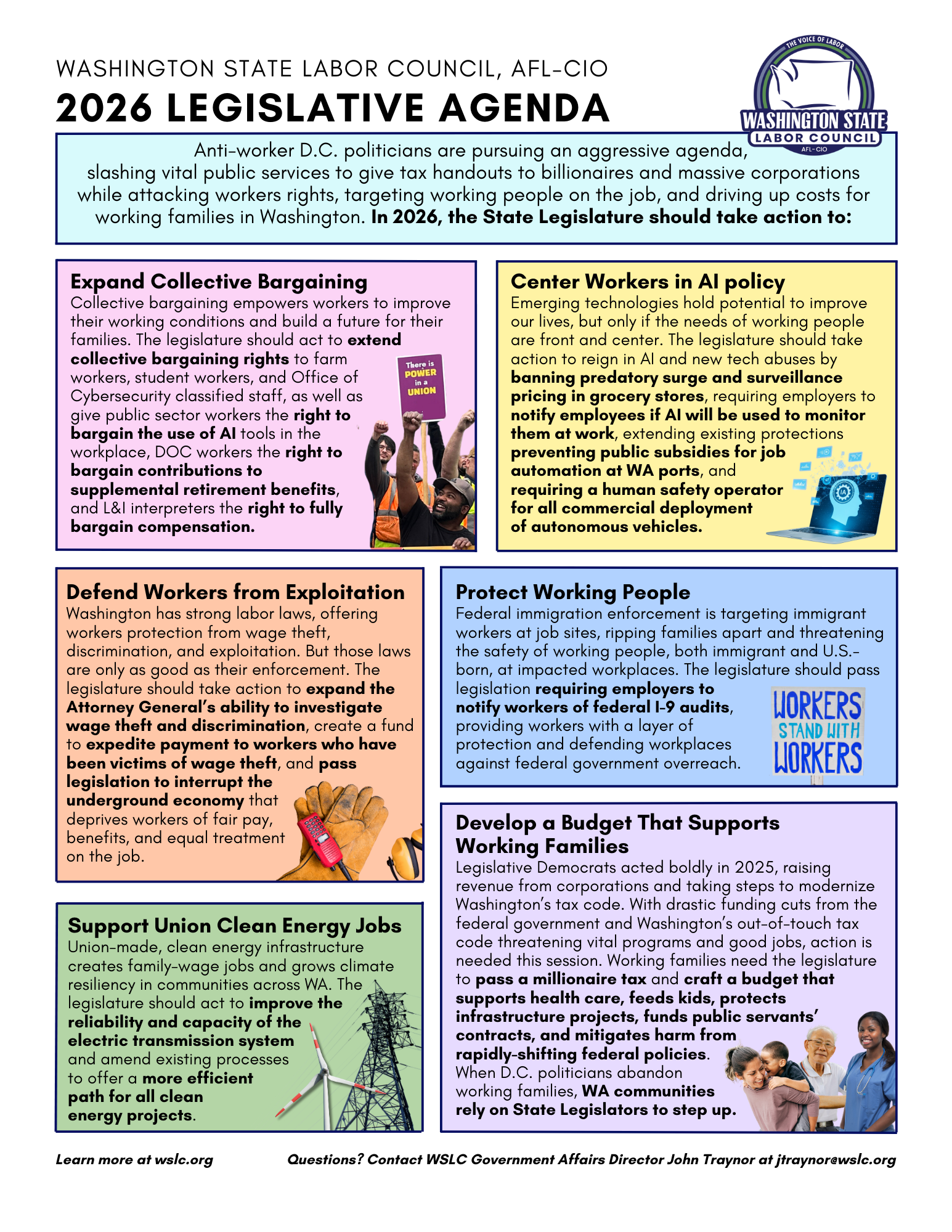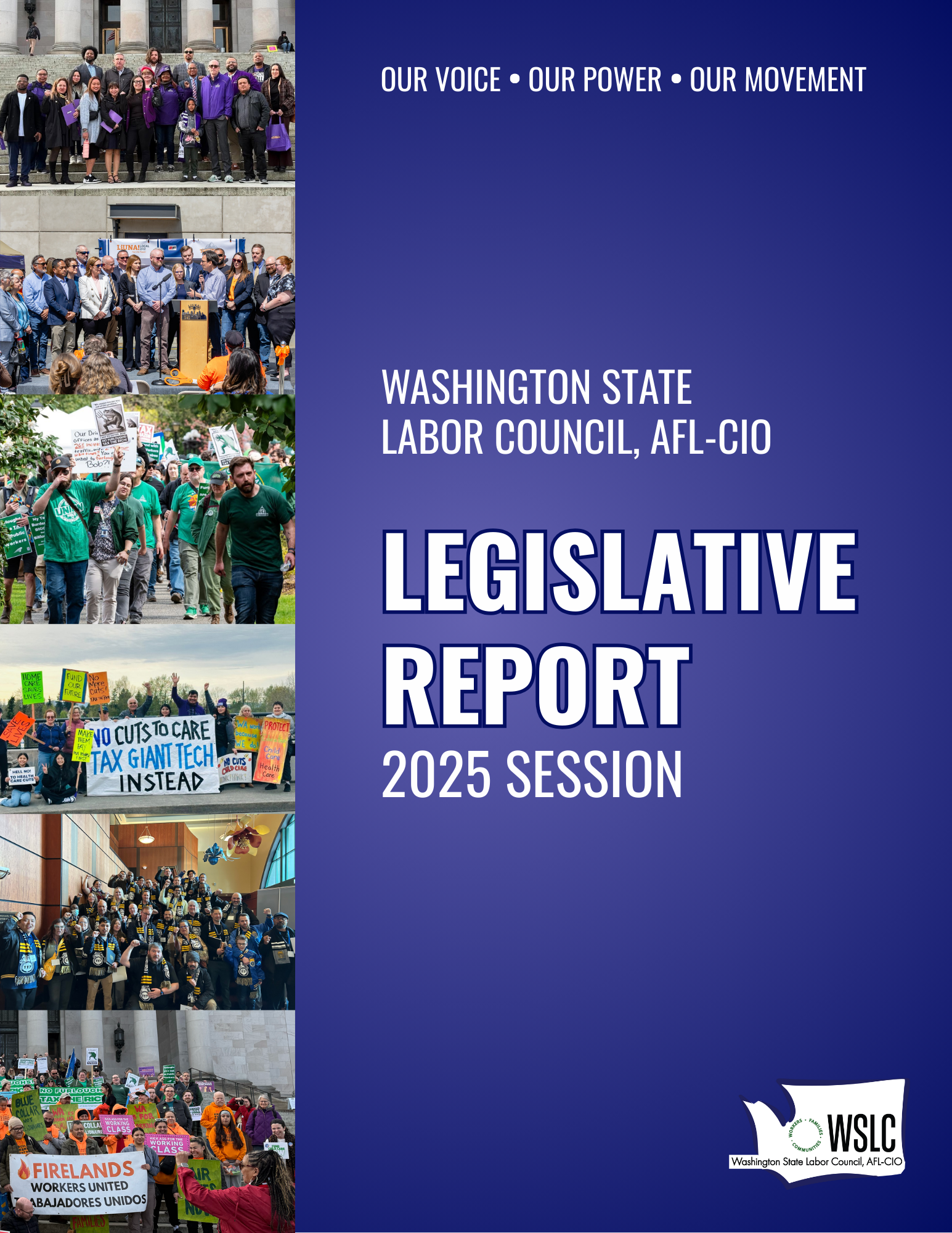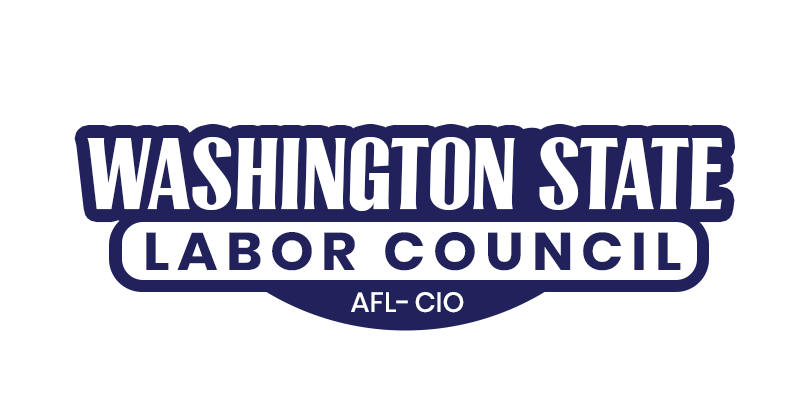 One of the services the Washington State Labor Council, AFL-CIO provides its affiliated unions is legislative education and advocacy. As with collective bargaining, by joining forces and speaking with a united voice on public policy issues affecting working families, labor has greater influence. There are more than 600,000 union members in Washington — 16.5% of the non-agricultural workforce — ranking us as one of the more unionized states in the nation. With few exceptions, the positions taken by the WSLC are on issues affecting ALL working people, not just union members. From equal pay to minimum wage to workers’ compensation, the WSLC is proud to advocate for both rank-and-file union members and for all working families.
One of the services the Washington State Labor Council, AFL-CIO provides its affiliated unions is legislative education and advocacy. As with collective bargaining, by joining forces and speaking with a united voice on public policy issues affecting working families, labor has greater influence. There are more than 600,000 union members in Washington — 16.5% of the non-agricultural workforce — ranking us as one of the more unionized states in the nation. With few exceptions, the positions taken by the WSLC are on issues affecting ALL working people, not just union members. From equal pay to minimum wage to workers’ compensation, the WSLC is proud to advocate for both rank-and-file union members and for all working families.
2026 WSLC Legislative Agenda
The Washington State Labor Council, AFL-CIO’s 2026 Legislative Agenda is centered on empowering working people and protecting working families. 
View the Council’s full agenda.
D.C. politicians are slashing vital public services to give tax handouts to billionaires and massive corporations. The federal administration is attacking worker rights, targeting working people on the job, and driving up costs for working families in Washington state and beyond.
When D.C. politicians abandon working families, Washington state communities rely on state legislators to step up.
Learn more about specific policy priorities:
- Tax Millionaires
- Ban Surveillance Pricing (HB 2481/SB 6312)
- Include Mental Health Training in Apprenticeship Programs (HB 2492/SB 6282)
- Immigrant Worker Protection Act (SB 5852/HB 2105)
- Protect Good Jobs
- Increase Electrical Transmission Capacity
Media inquiries, please contact WSLC Communications Director Sarah Tucker at stucker@wslc.org.
For updates about the status of priority legislation — and Action Alerts explaining how you can help support their passage — subscribe to The STAND. An archive of all legislative news is available in The STAND’s State Government section.
2026 Legislative Reception & Conference
The annual WSLC Legislative Reception & Conference will be February 4 & 5. Affiliated union members can register for the Reception & Conference online now. Register by January 29.
Reception: February 4 | 5:30 – 8:00 p.m. | Heritage Room, Octapas (610 Water St SW, Olympia, WA 98501)
Conference: February 5 | Kenneth J. Minneart Center of Performing Arts (2011 Mottman Rd SW, Olympia, WA 98512)
Hotel Information
In consultation with UNITE HERE Local 8, and with the understanding that there are no union hotels in Olympia, we’ve provided this LINK to hotels in the area.
For more information, contact Executive Assistant to the President Willa Kamakahi at wkamakahi@wslc.org
2025 Legislative Report & Voting Record
 The 2025 edition of the Washington State Labor Council’s Legislative Report is now available. (Download the full PDF.) This annual report summarizes the fate of legislation affecting working families in each year’s session of the Washington State Legislature, and how each legislator voted on these issues. (You can also download the WSLC 2025 Voting Record only.) As always, many union members came to Olympia during the 2025 session to share their personal stories at hearings, or meet with their legislators, or demonstrate outside the State Capitol. As documented in this report, their voices were heard on a number of important issues. Rank-and-file labor activism continues to be the key to successfully advancing pro-worker policies.
The 2025 edition of the Washington State Labor Council’s Legislative Report is now available. (Download the full PDF.) This annual report summarizes the fate of legislation affecting working families in each year’s session of the Washington State Legislature, and how each legislator voted on these issues. (You can also download the WSLC 2025 Voting Record only.) As always, many union members came to Olympia during the 2025 session to share their personal stories at hearings, or meet with their legislators, or demonstrate outside the State Capitol. As documented in this report, their voices were heard on a number of important issues. Rank-and-file labor activism continues to be the key to successfully advancing pro-worker policies.
Printed copies of the WSLC’s 2025 Legislative Report will be distributed at the 2025 Convention in July. Officers, staff and rank-and-file members of WSLC-affiliated unions can request additional copies from Communications Director Sarah Tucker.
Previous years’ Legislative Reports:
2013 — 2014 — 2015 — 2016 — 2017 — 2018 — 2019 — 2020 — 2021 — 2022 — 2023 — 2024
Previous years’ WSLC Voting Records:
2003 — 2004 — 2005 — 2006 — 2007 — 2008 — 2009 — 2010 — 2011 — 2012 — 2013 — 2014 — 2015 — 2016 — 2017 — 2018 — 2019 — 2020 — 2021 — 2022 — 2023 — 2024
For earlier WSLC Voting Records and/or WSLC Legislative Reports, email Sarah Tucker.

 One of the services the Washington State Labor Council, AFL-CIO provides its affiliated unions is legislative education and advocacy. As with collective bargaining, by joining forces and speaking with a united voice on public policy issues affecting working families, labor has greater influence. There are more than 600,000 union members in Washington — 16.5% of the non-agricultural workforce — ranking us as one of the more unionized states in the nation. With few exceptions, the positions taken by the WSLC are on issues affecting ALL working people, not just union members. From equal pay to minimum wage to workers’ compensation, the WSLC is proud to advocate for both rank-and-file union members and for all working families.
One of the services the Washington State Labor Council, AFL-CIO provides its affiliated unions is legislative education and advocacy. As with collective bargaining, by joining forces and speaking with a united voice on public policy issues affecting working families, labor has greater influence. There are more than 600,000 union members in Washington — 16.5% of the non-agricultural workforce — ranking us as one of the more unionized states in the nation. With few exceptions, the positions taken by the WSLC are on issues affecting ALL working people, not just union members. From equal pay to minimum wage to workers’ compensation, the WSLC is proud to advocate for both rank-and-file union members and for all working families.
 The 2025 edition of the Washington State Labor Council’s Legislative Report is now available. (
The 2025 edition of the Washington State Labor Council’s Legislative Report is now available. (